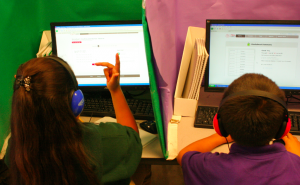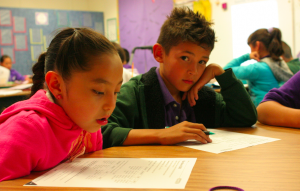“In math class, [the problems] are harder. And when I go to computer lab … I get them right. You learn more stuff, and it’s really fun,” Xochitl said.
For math teacher Alana Mednick, the Rocketship program makes good sense. "I don’t have to go through a lot of practice and kill and drill exercises," she says (there's that phrase again.) "They’ll be doing that using fun games and exercises, and in here they’ll be applying their practice knowledge. I think I’m allowed to be a teacher, more so because of this model, because I can teach to their general needs rather than having to play catch-up. So I’m teaching what I’m supposed to rather than what should have already been taught."
Andy Jones, who analyzes trends in learning and technology at U.C. Davis, says computer programs can fill a huge hole in the learning process, allowing educators to focus on bigger things.
“Information that was once presented with a focus on recall and knowledge that can be delegated to technological implements, computer programs or web-based tools,” Jones said. “Instructors have to find what is the perfect balance between occupying their students with something that is fun, and giving them an opportunity to learn something important. That sweet spot is often difficult to hit for a programmer, or a textbook company or an instructor.”
Rocketship schools' intense focus on test scores seems to be paying off. Their average API score is 868, far above public schools in similar low-income neighborhoods. At its flagship school, Rocketship Mateo Sheedy Elementary, where 91% of students qualify for free or reduced lunch, the 925 API score is the same as the average of the Palo Alto School District, a much more affluent community nearby.
What's more, an independent study released in August by SRI International, which conducted a randomized controlled trial using DreamBox Learning, one of Rocketship's math computer programs, those who used the program for 16 weeks scored 2.3 points higher on the Northwest Evaluation Association math test than those who didn’t — the equivalent to progressing 5.5 points in percentile ranking (for example, from 50 percent to 55.5 percent).
According to Aylon Samouha, Rocketship's Chief Schools Officer, those students’ gains are not only statistically significant, but the fact that they were achieved in such a short time — 16 weeks — indicates that using the program for an entire school year would show even greater gains.
Motivating Rocketeers to do well on tests is a priority at Rocketship schools, as evidenced by the signs that hang from classrooms on campus. Hand-written and printed signs read “90% of students will score 90% (or higher)”; “Shoot for 950” in reference to current the 925 API score at the Mateo Sheedy campus; and “Beat the Test.”
SILICON VALLEY INNOVATION AND MONEY
Rocketship schools' location in the heart of Silicon Valley is no coincidence. It's tapping into the area's spirit of tech innovation and deep pockets. The company has received a huge influx of cash -- $3 million -- from Silicon Valley executives of companies like Netflix, Facebook, and Skype.
The money will be spent to improve Rocketship’s computer software used to assess students, generate learning plans that identify student needs, and manage all the influx of data that comes from each of the learning programs.
As the school charter network grows, it'll be interesting to watch how it's received by other school districts, and how or whether the company itself will change to keep up with the growth.
- Reported with Ana Tintocolis



